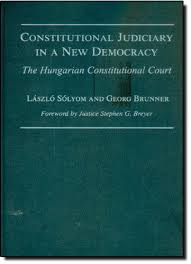
| Judul | Constitutional Judiciary In a New Democracy: The Hungarian Constitutional Court / La´szlo´ So´lyom |
| Pengarang | Solyom, La´szlo´ Georg Brunner |
| Penerbitan | Ann Arbor, Michigan : Michigan Press, 2000 |
| Deskripsi Fisik | x, 417 p. ; 24 cm. ;24 cm. |
| ISBN | 9780472109654 |
| Subjek | Hungary; Constitutional law --Hungary --Cases Constitutional courts --Hungary |
| Abstrak | Two in-depth essays and a selection of twenty-seven of the most important decisions present the Hungarian Constitutional Court as one of the most important actors of the transition into democracy in a post-communist country. How was it possible that a new Court established in 1990, in a country just released from forty years of Communist rule, was able to enforce a Constitution, maintain the rule of law, and protect the freedom of its citizens in a way comparable to the U.S. Supreme Court? This new Court has issued decisions on topics ranging from the establishment of democracy and a market economy--privatization, compensation for the nationalization of property, and retroactive criminal legislation--as well as such issues as the constitutionality of capital punishment, abortion, freedom of speech and the media, and the separation of powers. U.S. Supreme Court Justice Stephen Breyer provides the foreword and introduces the two essays that begin the book. In the first essay, Georg Brunner explains how the Court was set up and what its procedures are. In the second, Lázszló Sólyom describes systematically the emergence of the case-law of the Court and its jurisprudence on constitutional rights and on the powers and procedures of the other branches of government. The models followed by the Court are outlined, and its contribution to global constitutionalism explored. Lázszló Sólyom is President of the Constitutional Court of Hungary and Professor of Law, ELTE University of Budapest. Georg Brunner is Professor of Law, University of Cologne, Germany. |
| Bahasa | Inggris |
| Bentuk Karya | Tidak ada kode yang sesuai |
| Target Pembaca | Tidak ada kode yang sesuai |
| Tag | Ind1 | Ind2 | Isi |
| 001 | INLIS000000000009363 | ||
| 005 | 20221109085025 | ||
| 008 | 221109################|##########|#eng## | ||
| 020 | # | # | $a 9780472109654 |
| 035 | # | # | $a 0010-0520009363 |
| 041 | $a eng | ||
| 082 | # | # | $a 347.43902 |
| 084 | # | # | $a 347.43902 SOL c |
| 100 | 0 | # | $a Solyom, La´szlo´ |
| 245 | 1 | # | $a Constitutional Judiciary In a New Democracy: The Hungarian Constitutional Court /$c La´szlo´ So´lyom |
| 260 | # | # | $a Ann Arbor, Michigan :$b Michigan Press,$c 2000 |
| 300 | # | # | $a x, 417 p. ; 24 cm. ; $c 24 cm. |
| 520 | # | # | $a Two in-depth essays and a selection of twenty-seven of the most important decisions present the Hungarian Constitutional Court as one of the most important actors of the transition into democracy in a post-communist country. How was it possible that a new Court established in 1990, in a country just released from forty years of Communist rule, was able to enforce a Constitution, maintain the rule of law, and protect the freedom of its citizens in a way comparable to the U.S. Supreme Court? This new Court has issued decisions on topics ranging from the establishment of democracy and a market economy--privatization, compensation for the nationalization of property, and retroactive criminal legislation--as well as such issues as the constitutionality of capital punishment, abortion, freedom of speech and the media, and the separation of powers. U.S. Supreme Court Justice Stephen Breyer provides the foreword and introduces the two essays that begin the book. In the first essay, Georg Brunner explains how the Court was set up and what its procedures are. In the second, Lázszló Sólyom describes systematically the emergence of the case-law of the Court and its jurisprudence on constitutional rights and on the powers and procedures of the other branches of government. The models followed by the Court are outlined, and its contribution to global constitutionalism explored. Lázszló Sólyom is President of the Constitutional Court of Hungary and Professor of Law, ELTE University of Budapest. Georg Brunner is Professor of Law, University of Cologne, Germany. |
| 650 | 4 | $a Constitutional courts --Hungary | |
| 650 | 4 | $a Hungary; Constitutional law --Hungary --Cases | |
| 700 | 0 | # | $a Georg Brunner |
| 990 | # | # | $a 22558/MKRI-P/XI-2011 |
| 990 | # | # | $a 22558/MKRI-P/XI-2011 |
| 990 | # | # | $a 22559/MKRI-P/XI-2011 |
| 990 | # | # | $a 22559/MKRI-P/XI-2011 |
Content Unduh katalog